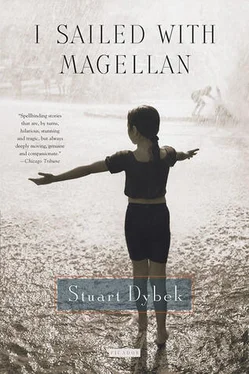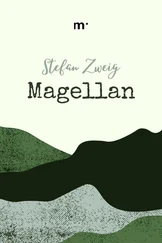Even before his conversion to Santeria, Mick and I often disagreed about which of us more accurately recalled the past. He’d tell me about Sir dangling him in outer space above Eighteenth Street, and I’d remember the fire escape under the window. I’d recall a family vacation at Eagle Lake, a weedy little Michigan lake with a mud beach and leeches in the reeds — bloodsuckers, we called them. We called Mick the Lifeguard of Eagle Lake for the way he’d windmill his arms as he bounded through chest-deep water, convinced he was swimming. But what Mick remembers is Sir burning leeches off our bodies with a cigarette, a scene that I think we actually both saw in a movie about explorers in the jungles of Borneo.
“That never happened,” I’d insist. “You always make it out more dramatic than it was.”
Mick would look at me, shake his head condescendingly, and give me the Sir salute, a dismissive wave of the hand our father used whenever he felt someone was trying to gyp him. “By any chance you familiar with the term ‘repressed memory’?” Mick would ask.
“You’re not talking about memory. You’re talking about half-empty water glasses and dreams.”
“You don’t think dreaming is a kind of remembering? And if it is, then why wouldn’t memory be a kind of dream?”
Where we’ve never disagreed is over our memories of food. We can recite every detail of meals we shared growing up, like those meatless Friday dinners: fried frog legs Sir brought home from the fish house beside the Sanitary Canal — we joked that the frogs came out of the canal — or potato pancakes with applesauce; or one of Sir’s favorite dishes, potatoes mashed with browned onion and served steaming in a bowl of cold buttermilk. We both remember our father cooking his special Sunday breakfast, slices of smoked kielbasa scrambled with eggs, peppers, potatoes. Mick would pile a huge portion between slices of toasted rye slathered with catsup, a creation known as the Stufff a-Mouth Delight. The Polish sausage that Mick carries now is wrapped in brown butcher paper. From where they’re sitting, the gang bangers probably can’t smell the strong aroma of garlic or see how fat has seeped through the natural casing and left glistening spots on the butcher paper. For all they know, Mick might have a weapon wrapped in brown paper, a jumbo lead-cored sap.
“Qué tú quieres,” the kid asks my brother again, then lights a cigarette with a lighter snapped open like a switchblade, and blows the smoke in Mick’s direction.
Mick shrugs: Ho to explain to guys who’ve probably never been out of the hood why someone would come back for a look? They’re all lighting up and Mick wouldn’t mind a smoke. In fact, he’s dying for one, but something tells him now is not the time to ask. He’s given up smoking since he burned down the apartment in New York he’d shared with Mirza.
The fire happened only a few weeks after she’d packed a suitcase of her stuff and moved to her mother’s in Astoria. He still thought then that she might be coming back. True, she’d taken their borzoi, Diablo, but undergarments that retained her scent of gardenias were left in the laundry bag, her leather winter coat still hung in the closet above rows of high heels, and the tapes of music to which she practiced dance routines were stacked beside a boom box. She wouldn’t leave for good without taking her music or her shoes. Mick was counting on that. Those abandoned, beautiful shoes for which she’d shopped compulsively became his altar of hope.
Mick had worked a double at the mob-owned clam bar in midtown where he waited tables and had come home drunk to his fifth-floor walk-up on Delancey. Head pillowed by the shirt and trousers he’d removed, he lay on the bare kitchen table, the table they’d swept clean and then made love on the night before she left. He hadn’t known that she was fucking him goodbye. He covered his face with a slip she’d left behind and inhaled the oils of her skin. The pearly fabric brought back winter nights when her bare skin made him feel feverish — they’d cling so tightly together that he couldn’t tell which one of them was trembling — and he remembered how the room would fill with the scent of gardenias the way it’s said the attar of flowers precedes stigmata. With an ashtray balanced on his stomach, and the slip veiling his eyes against the streetlight, Mick drowsed off to the reverberation of the boom box dialed to the Latin station: Tito Puente. He woke choking, blinded by smoke, rolled off the table and crawled along the floor between boxes of their belongings that were shooting up flames. His pillars of books were burning, and it seemed as if the ideas he’d lived by were burning, too. The scent of gardenias from the laundry was burning, not simply her underclothes but the fragrance itself fuming into toxic smoke. He could hear their possessions popping in the fire and thought of her shoes shriveling into ash as he felt along the wall for the door — the metal doorknob hot to the touch — and staggered out onto the stairwell in his underwear. His lungs felt scorched. He knelt, his eyes tearing as he gagged on his own sooty breath. Between spasms of dry heaves, he heard sirens and screams and suddenly realized the screaming was Leon, his cat, holed up somewhere in the apartment. He tried to go back in after the cat, but the smoke was too thick, the heat intense. “Leon! Leon!” he shouted to guide his cat through the smoke, then remembered the cat was deaf. From inside the apartment he could hear the radio still blaring, and even recognized the song “Hojas Blancas,” a song Mirza loved. She had the tape by El Gran Combo, a tape that was melting into lethal fumes of acetate. He could hear the jazzy, lilting chorus. “Están cayendo hojas blancas en mi cabello”: white leaves are falling on my hair. He heard Leon and shouted back, but only the Spanish lyrics answered — maybe he only imagined them mixed with the furious crackle of fire:
There arrives a moment in which I feel very happy
for the good I have done in my life,
and then there comes a moment of grand repentance
for all the errors I have committed.
“You know that expression, tearing your hair out?” Mick asked when he told me the story. “Well, it ain’t just an expression. I didn’t know that was what I was doing till a fireman pulled me away and told me to take it easy.”
I’d met Leon, a blue-eyed, white male Persian, when I visited Mick for a weekend after he moved to New York to study acting. I rode a train from Chicago, got in on Friday night, and Mick, who’d taken the weekend off from work, was waiting at Penn Station. We walked down Broadway, him toting my backpack and telling me how he’d found Leon at three a.m. on the tracks in a downtown subway station. Mick loved cats; we both did, as did our father. Sir never let us have a dog, but we’d had cats.
“Cats, swimming, getting a bargain, and food — the man loves to chow down,” Mick said, totaling up Sir’s favorite things. “I think that about covers it.”
“He loves to sing.”
“Oh yeah, there’s that.”
We simultaneously launched into a chorus of “Memphis, Memphis, Memphis,” a song Sir composed when Harvester, where he’d worked most of his life, closed its Chicago plant. He was fifty at the time, and moving to Tennessee must have seemed like salvation next to the alternative of being out on the street — the fate of most of his co-workers. Sir sang the song adding a blat of Al Jolson to his baritone voice, his idea of a Southern accent. The lyrics went “Oh, Memphis, Memphis, Memphis, Tennessee …,” repeated ad infinitum.
We were on a fifth chorus when Mick cautioned, “Not so loud or someone will hear what a catchy tune it is and rip it off and then we’ll be in a real mess.” It was a concern of our father’s that someone might steal his song and get rich.
Читать дальше












